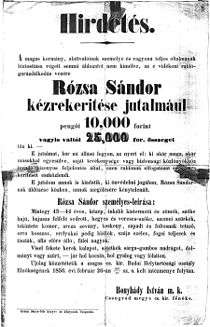Betyár
| Founding location | Kingdom of Hungary |
|---|---|
| Years active | Early-late 19th century |
| Territory | Hungary and Slovakia |
| Ethnicity | Hungarian and Slovak |
| Criminal activities | banditry, highway robbery, horse theft mail, robbery, train robbery |
.png)

The betyárs (Hungarian: betyárok), were the highwaymen of the 19th century Kingdom of Hungary. The "betyár" word is the Hungarian version of "Social Bandit".[1] (The word itself is of Ottoman Turkish origin, meaning 'bachelor' or 'unmarried man'.)
Several betyárs have become legendary figures who in the public mind fought for social justice. The most famous Hungarian betyárs were Sándor Rózsa from the plain, Jóska Sobri, Jóska Savanyú from Bakony and Márton Vidróczky from Mátra.

Hungarian folktale tradition
Until the 1830s they were mainly regarded as criminals, but an increasing public appetite for betyár songs, ballads and stories gradually gave a romantic image to these armed and usually mounted robbers. Rózsa is only the foremost of many Hungarian outlaw heroes, or betyárs, who appear in Hungarian history and folklore.[2] There is a far-flung Hungarian folktale tradition featuring a large number of local Robin Hoods.[2]
Famous betyárs
- Juraj Jánošík
- Sándor Rózsa
- Jóska Savanyú
- Jóska Sobri
- Márton Vidróczki
See also
References
- ↑ Shingo Minamizuka, A social bandit in nineteenth century Hungary: Rózsa Sándor, East European Monographs, 2008, p. 1
- 1 2 Graham Seal, Outlaw Heroes in Myth and History, Anthem Press, 2011, p. 79